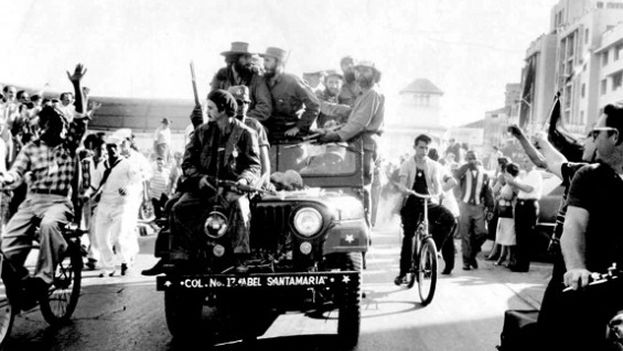
![]() 14ymedio, Pedro Campos, Havana, 23 February 2016 – As of early 1959, the rebel group that capitalized on the democratic revolutionary win against the Batista dictatorship began labeling as counterrevolutionaries anyone who questioned their decrees, policies and decisions, without differentiating between those who did it through healthy dialog – including from their own ranks – and those who openly and violently confronted them.
14ymedio, Pedro Campos, Havana, 23 February 2016 – As of early 1959, the rebel group that capitalized on the democratic revolutionary win against the Batista dictatorship began labeling as counterrevolutionaries anyone who questioned their decrees, policies and decisions, without differentiating between those who did it through healthy dialog – including from their own ranks – and those who openly and violently confronted them.
The fight for the restoration of democratic institutions was what had united the Cuban people at that time. The trigger that divided the large anti-Batista coalition was the interest of the rebel leaders to prioritize social and economic transformations and to postpone, indefinitely, the holding of elections and the establishment of a democratically elected government based on the 1940 Constitution.
This disdain for democracy, a disregard for the interests of others and those who thought differently, as well as the channeling of the torrent of revolutionary spirit among the people according to the narrow interests of this rebel core, led to early and subsequent confrontations and gave rise to a diverse opposition and “counterrevolution” that would encompass every political-economic and social aspect that this core considered a threat to its power.
Throughout all the years since, they have maintained this approach of putting in the same “counterrevolutionary” bag all those who simply disagreed or who did not support some “revolutionary” measure, along with those who chose to confront them in a violent way.
Now in Cuba, in 2016, general-president Raul Castro, brother of the historic leader, will soon receive the president of the United States, a country that is “the center of the imperialist world, cradle of the counterrevolution, the historic enemy that has tried by every possible means to destroy the Cuban Revolution.”
But internally Raul Castro’s government does not even recognize that there is an extensive non-governmental democratic socialist side that, from dialog rather than confrontation, has done everything possible to make its constructive positions known to the leadership of the Party-State-Government, the Cuban people, international public opinion and the historical opposition.
Many of us have been treated as counterrevolutionaries and enemies, and if they have left some spaces where we can participate, such as the magazine Temas (Themes), meetings of the Cuban Writers and Artists Union (UNEAC), the Juan Marinello Foundation and others, they apply to us covert and sophisticated forms of repression, trying to block our message and keep us as far as possible from decision making, that is away from the bureaucracy that is the main brake on advances in the country, and which, like ivy clinging to a wall, clings to power and denies the people and the workers.
But even this does not lead us to fall into provocations and abandon our democratic vocation of dialogue and move to confrontation and violence.
We must trust and work so that the influence of the majority of the people who do not want more violence, but rather democracy and participation, leads the Government to undertake a process of internal dialogue and negotiation, like that it is undertaking with the “historical enemy,” “French imperialism” and other less recognized imperialisms, that will open the channels to the democratization of politics and economy.
As a democratic socialist I deplore violence, terrorism, vindictiveness and a settling of old scores and once again I call on the Government-Party-State to cease repression of thought and the peaceful political activism of those who think differently, and to undertake a process of democratization leading to the reconciliation of Cuban society.
It is time to understand that it is not the same to disagree, to differ, to dialogue and try to seek an understanding, as it is to oppose dialogue and engage in open confrontation. It is not the same to support the blockade-embargo and the politics of external pressure, as it is to support international policies of dialog and rapprochement.
Some of us democratic socialists have met with members of the opposition in search of consensus for an inclusive national dialogue and to open avenues for the process of democratization that we long for, but we have never supported open confrontation, violence and provocation, nor have other peaceful opponents done so.
It is time for the Cuban government to change this mistaken focus of considering anyone who does not share its methods and conceptions a “counterrevolutionary,” which hinders a much needed national dialog, and to internalize the same processes of consultation and peace that guide its foreign policy.
